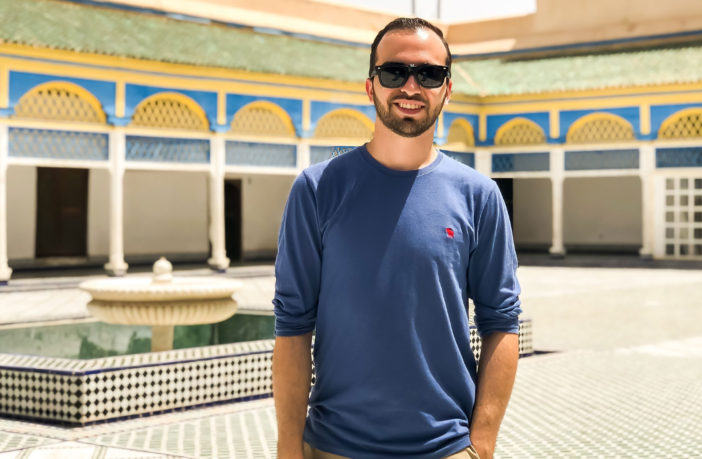Oakland University News
Ghazi Ghazi spent eight weeks in Morocco as part of the U.S. State Department’s Critical Language Scholarship program.
After immigrating to the U.S. from Iraq, Ghazi Ghazi made a conscious effort to assimilate into American culture. For him, that meant eschewing his native language of Arabic in favor of speaking English.
“I got far away from it and tried to erase it out of my mind,” Ghazi said of his mother tongue. “Then, around the start of college, I started to come back to it.”
Ghazi enrolled at Oakland University and declared a major in International Relations. The program requires students to take two years of a foreign language. Ghazi chose Arabic. He took every Arabic course offered at OU and cultivated a passion for learning about the history and cultures of the Middle East.
This summer he took his interests to a new level, spending eight weeks in Morocco as part of the U.S. State Department’s Critical Language Scholarship program. This intensive overseas language and cultural program provides funding for American university students to study foreign languages deemed critical to national security and economic prosperity.
After attending a pre-departure orientation in Washington, D.C., Ghazi went to Morocco, where he lived with a host family and took language classes at the Arab American Language Institute. The classes featured accelerated instruction in formal Arabic and the Moroccan dialect of Arabic. Ghazi explained that learning formal Arabic will help him pursue his goals of working in the U.S. Foreign Service and teaching Arabic at the university level.
“The thing about Arabic is that there’s two versions of it,” he said. “There’s formal Arabic, which is used in newspapers and broadcasts, and there’s dialect Arabic, which varies from country to country. In order to use Arabic in professional settings, you need to know the formal version.”
| Soft drinks and super glue In language, as in life, some of the most memorable lessons happen outside the classroom – a reality Ghazi experienced during his studies in Morocco.”One time I went into a store and tried to order a cola,” he recalled. “So when the clerk brought me a bottle of super glue, I was totally confused.”It turns out that in the Moroccan dialect, the word for cola is similar to the word for super glue. You have to ask for Coca-Cola, Ghazi explained. “It was kind of frustrating in the moment, but I realized that it’s all part of what goes into mastering a language. Making mistakes allows you to learn from them.” |
The classes were intense, Ghazi recalled. There were tests and homework each week, and students took an oath promising to abstain from speaking English, both at school and with their host families. They studied textbook grammar and reading lessons, and practiced their speaking skills with conversation partners. They worked with tutors to tackle the nuances of Arabic.
“We have letters in Arabic that we don’t have in English,” Ghazi explained, “so it’s harder for American students to speak it. We had a lot of different teachers helping us with reading, writing and speaking.”
The curriculum also prepared students to take the Oral Proficiency Interview, a standardized assessment that certifies various levels of language proficiency. Before leaving Morocco, Ghazi passed the exam with a high level of proficiency, which will aid him in seeking a Foreign Service job.
“A lot of jobs call for a specific proficiency level,” said Ghazi. “You also receive non-competitive status, which gives you certain advantages in the hiring process.”
Outside of language classes, Ghazi and his peers participated in extracurricular activities, including cooking, music and calligraphy classes. They also visited museums and other cultural sites.
But what made the experience truly impactful, he said, was the people he met.
“I was really lucky to have such a great group of people to share the experience with,” Ghazi said. “I made some amazing friendships. We got to be really close and made a lot of new connections with our host families, Moroccan teachers and language partners.”
Ghazi is currently applying to graduate school, with plans to become a diplomat and eventually a college professor, specializing in Middle Eastern studies. Dispelling misconceptions about the region is one of his top priorities.
“Coming from Iraq as a refugee, and growing up in America after 9/11, I noticed that the Middle East is not always painted in the greatest light,” he said. “Bridging the gap between what people see in the media and what the Middle East and North Africa are truly about – the beautiful cultures and traditions – is really important to me.”







